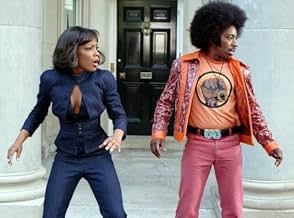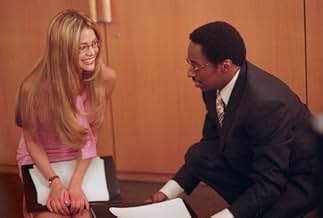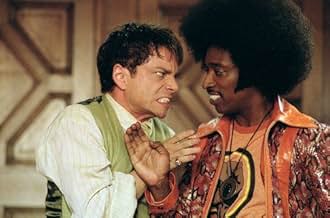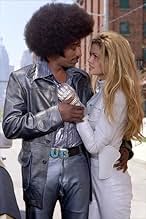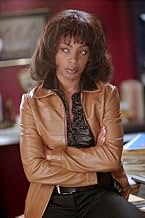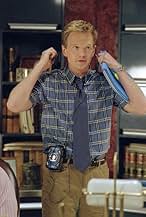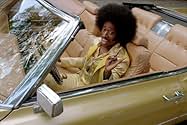Lorsqu'on tente de faire dérailler la campagne présidentielle d'un candidat noir, Undercover Brother et ses collègues agents secrets viennent à la rescousse.Lorsqu'on tente de faire dérailler la campagne présidentielle d'un candidat noir, Undercover Brother et ses collègues agents secrets viennent à la rescousse.Lorsqu'on tente de faire dérailler la campagne présidentielle d'un candidat noir, Undercover Brother et ses collègues agents secrets viennent à la rescousse.
- Réalisation
- Scénario
- Casting principal
- Récompenses
- 1 victoire et 7 nominations au total
- Sistah Girl
- (as Aunjanue Ellis)
- Roscoe the Barber
- (as William Taylor)
- Bonnie - TV Reporter
- (as Susie Spear)
- Chad - TV Anchor
- (as Jim O'Conner)
Avis à la une
The film isn't about belittling or ridiculing "white people."
The film is about tackling prejudices: And specifically those among the U.S.'s so-called "white" and "black" populations, but told from, ostensibly, a "black" perspective, and told with humor.
Reading the negative comments on this film I wonder what movie some of the angry folks were watching. Racism is using one's own physical traits to establish social superiority over another person, or group of people, who don't look like themselves. I saw nothing of any of the African/Black/persons-of-color trying to "reverse role play" by holding themselves in a superior light over so-called "white people."
It simply wasn't there.
Myself, I hate "white guilt" messages in media of all forms. I've had enough social agenda thrust in my face. But that's NOT THE MESSAGE of "Undercover Brother."
What a lot of the "angry-white-commentators" are bothered by is the fact that they believe this film makes ALL so-called "white persons" look like evil-clowns, or condescending jerks. IT DOESN'T. If that's what you see in this film, then maybe you shouldn't be watching movies in the first place.
This film, as stated clear as day by both cast and crew, is an attempt to tackle a social problem with good humor. If you're offended by the jokes in this film, then you've completely missed the point, and are, in fact, the racist idiot that you claim this film to be (I believe psychologist call this phenomenon "projection," where someone refuses to acknowledge their own faults, and casts their own negative qualities on people they dislike).
But to the movie; it was hilarious. Myself, not being black, I couldn't help but laugh of the number of stereotypes this film poked fun at; especially "Conspiracy Brother" (played by Dave Chappell), whose loose form of illogic-thinking and one-liners had me, quite literally, falling out of my chair with laughter. And Neil Patrick Harris (Doogie Howser M.D. fame) playing the "affirmative action" intern nearly bust my gut, particularly near the end of the film. And Chris Kattan as the evil high energy second in command was just brilliant. The entire cast and film was superb. Think "Shaft" meets "Get Smart" here. :-)
What this film needed was to poke more fun at itself in a more direct manner. In a large sense this film pokes fun at itself in terms of its genre, but I think it also needed to show a couple more stereotypes. One of the great "high-profile" stereotypes in white America are black people talking in theaters, or otherwise being loud and obnoxious in places and circumstances "white" Americans thinks inappropriate. It would've been nice to see Undercover Brother cleaning up "his peoples" stereotypes, but doing so with humor before going after "the man."
I think that's a thing the film makers missed, because the other thing I believe "angry white commentators" are bothered by is the fact that there are "black" folks who have their own prejudices, and that this film might seen by that segment of black-America as a green light for ridiculing "whites." IT ISN'T.
One of the other themes the film makers missed is the coupling that that occurs between Denise Richard's character and Eddie Griffin's character. One of the primary drives of racism is the abhorrence of interracial couples. This plot point, even though it's high comedy, seemed implausible for a racially motivated antagonist. Then again, that may've been part of the film makers' strategy to show how ludicrous racial prejudice is, and can be.
The final mistake, and this is more of a minor quibble, but a profound one from a fan of this film, was the downplay of Jim Kelley's role in this film.
Where I grew up Jim Kelley was a hero, and this was amongst a circle of friends who were all white. I think the marketing decision to ace Jim Kelley's role in this film was a mistake. Not a huge one, but a mistake nonetheless.
If you're still of the opinion that this film is racist (assuming you've read this far and haven't burst a blood vessel), then I would suggest you're taking the film too personally, because the film isn't ridiculing so-called "white-people," but prejudice that, in this case, is assumed by a large chunk of white America. If you think otherwise, then you're not viewing this film with a clear mind.
Beyond that, it's one of the funniest films I've ever seen. View it with a relaxed and open mind, and enjoy some of the biggest laughs to ever hit the big screen.
But here, we have a brilliantly funny comedy about a black man mentally stuck in the 70s who's out their protecting racial equality. We also have "The Brotherhood," a secret organization doing the same thing, consisting of mostly blacks. But they stress the message that you just have to be "down" to be in the brotherhood, and you don't have to be black. At first, it seems like only blacks are welcome. But then they realize that working as an equal team is how the job should really be done, regardless of one's race. So this movie has a good message, despite all the racial jokes.
But enough of that. This movie is hilarious! The jokes they make about both black culture and white culture kept me laughing all the way through. You can't take it too seriously. If you do, getting offended will come with the territory for you, and that's not what this movie is about. What goes through my head when the jokes are cracked is, "That's exactly how it is!" And I'm a white guy.
Sure, a lot of the jokes are ones that have been used before. But the WAY they're used in this movie and the creativity behind it all is what made me laugh.
So if you don't get offended easily by culture jokes, and you're in the mood to laugh a lot, this movie is for you.
Le saviez-vous
- AnecdotesDenise Richards claims that her derriere was digitally enlarged for the film's cover and promotional material.
- GaffesWhen Lance asks Undercover brother about the show Friends (1994), he asks what Ross saw of Julie's in the third season. This happened in the second season, Julie was not on Friends in the third season. He also calls her Julia instead of Julie.
- Citations
Undercover Brother: Are you telling me there really is a Man'?
Conspiracy Brother: What do you think? Things don't just happen by accident! Sometimes people - mostly *white* people - make things happen!
Undercover Brother: So the conspiracies we've believed for all these years are true? The NBA really did institute the three point shot to give white boys a chance?
Smart Brother: Absolutely!
Undercover Brother: Then the entertainment industry really *is* out to get Spike Lee?
Conspiracy Brother: Come on man! Even Cher's won an Oscar! Cher!
Undercover Brother: Then O.J. really didn't do it?
[Everyone looks away and mumbles]
The Chief: We... we ain't got time for this!
- Crédits fousEarly in the credits, Undercover Brother gets his convertible washed at the car wash with the top down.
- Versions alternativesFor the UK DVD release Universal chose to cut 14 sec. from the outtakes (two uses of very strong language) to keep the "12" rating. An uncut "15" was available.
- Bandes originalesPick Up The Pieces
Written by Alan Gorrie, Roger Ball, Onnie McIntyre, Hamish Stuart, Malcolm Duncan and Robbie McIntosh
Performed by Average White Band
Courtesy of Average White Band and Joe's Songs, Inc.
By Arrangement with Bug
And courtesy of Atlantic Recording Corp.
By Arrangement with Warner Special Products
Meilleurs choix
Détails
- Date de sortie
- Pays d’origine
- Langue
- Aussi connu sous le nom de
- Hermano Camaleón
- Lieux de tournage
- R.C. Harris Water Filtration Plant, Scarborough, Toronto, Ontario, Canada(The Man's headquarters, interior and exterior)
- Sociétés de production
- Voir plus de crédits d'entreprise sur IMDbPro
Box-office
- Budget
- 25 000 000 $US (estimé)
- Montant brut aux États-Unis et au Canada
- 39 089 928 $US
- Week-end de sortie aux États-Unis et au Canada
- 12 037 685 $US
- 2 juin 2002
- Montant brut mondial
- 41 604 473 $US
- Durée
- 1h 26min(86 min)
- Couleur
- Mixage
- Rapport de forme
- 1.85 : 1

